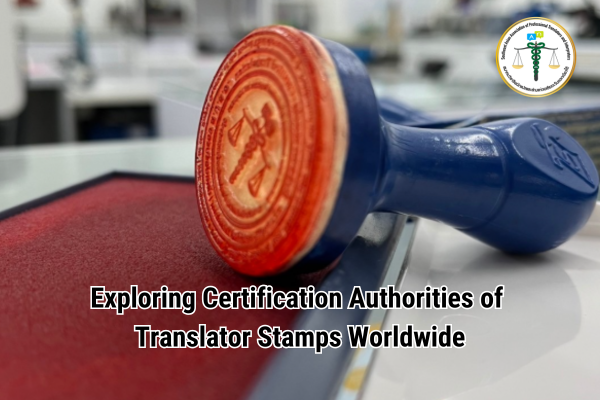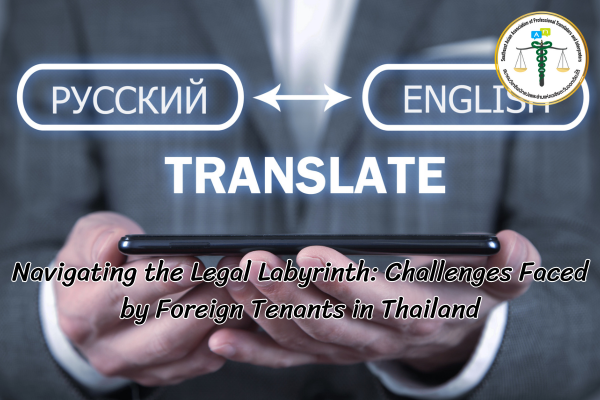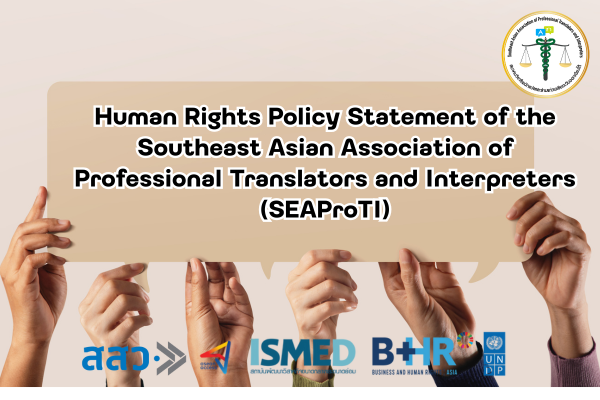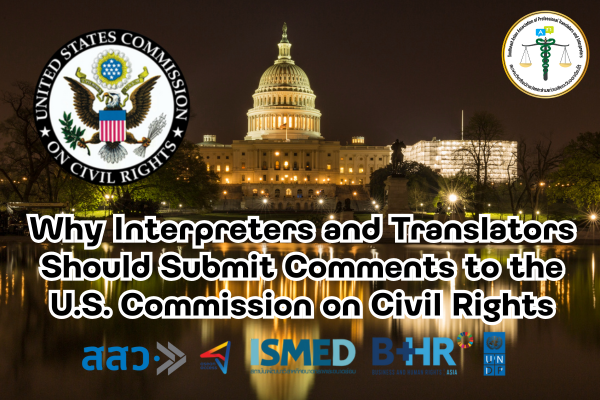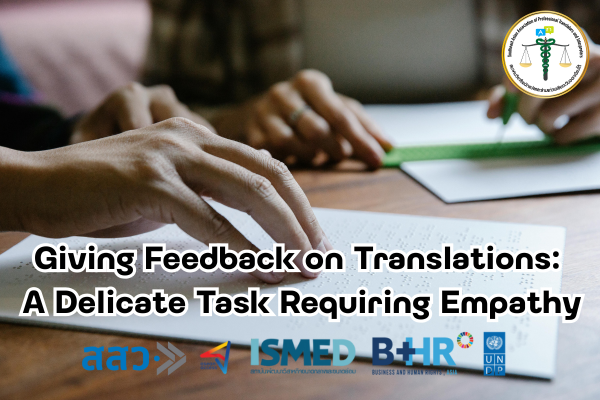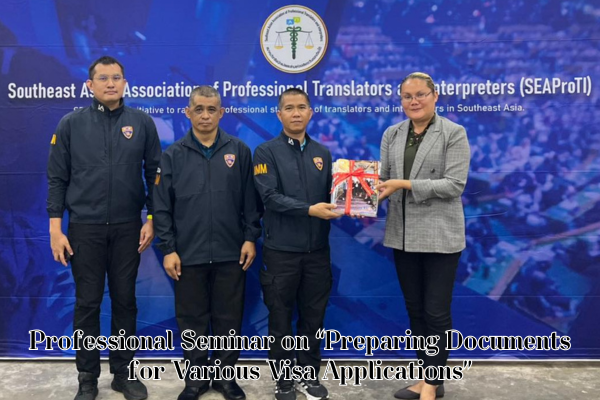Which Countries Have Certified Translators with Seals?
Exploring Certification Authorities and Systems Worldwide
In many countries around the world, professional translators who have been certified can use a Translator’s Seal to verify the accuracy and authenticity of translated documents. This certification system plays a crucial role in legal, governmental, and international transactions. However, each country has different regulations and standards—some require passing an exam and registering with a court, while others have professional associations overseeing certification.
In this article, we will explore 10 countries with certified translator seals and the organizations responsible for their accreditation, helping you understand these systems in depth and choose certified translation services recognized by law.
1. Germany
Certification Authorities:
-
Regional Courts
-
BDÜ (Bundesverband der Dolmetscher und Übersetzer e.V.)
Seal System:
-
Translators must pass an exam and be sworn in by a court.
-
They use a seal to certify translations for official and legal use.
Significance:
-
Sworn translations have legal status.
-
Required for immigration, marriage, and business documents.
2. France
Certification Authorities:
-
Cour d’Appel (Court of Appeal)
-
SFT (Société Française des Traducteurs)
Seal System:
-
Translators must be appointed by a Court of Appeal in France.
-
They receive the “Expert près la Cour d’Appel” seal.
Significance:
-
Certified translations are accepted in courts, government, and official agencies.
-
Useful for legal documents, further studies, and immigration.
3. Spain
Certification Authorities:
-
MAEC (Ministerio de Asuntos Exteriores, Unión Europea y Cooperación) (Spanish Ministry of Foreign Affairs)
Seal System:
-
Translators who pass the MAEC exam are designated as Traductor-Intérprete Jurado.
-
They can use an official seal for certifying legal translations.
Significance:
-
Recognized for legal procedures, immigration, and international contracts.
4. Italy
Certification Authorities:
-
Tribunale (Local Courts)
-
ALTI (Associazione Legale Traduttori e Interpreti)
Seal System:
-
Translators must register as Traduttore Giurato with a local court. However, Italy does not have laws regulating translators. Therefore, certified translators in Italy are not required to register with any specific authority. However, they must take an oath before a court, a notary, or a recognized authority when producing a certified translation, known as a Sworn Translation.
-
Their seal is used for legal contracts and official documents.
5. United Kingdom
Certification Authorities:
-
CIOL (Chartered Institute of Linguists)
-
ITI (Institute of Translation and Interpreting)
Seal System:
-
No official government seal, but professional associations offer certification seals.
Significance:
-
Translators who are CIOL or ITI members can certify translations for legal purposes.
6. United States
Certification Authorities:
-
ATA (American Translators Association)
Seal System:
-
No government-issued seal, but ATA provides professional certification.
7. Canada
Certification Authorities:
-
CTTIC (Canadian Translators, Terminologists and Interpreters Council)
Seal System:
-
Translators must obtain Certified Translator status from CTTIC or provincial bodies such as ATIO (Ontario), STIBC (British Columbia).
8. Brazil
Certification Authorities:
-
JUCESP (Junta Comercial do Estado de São Paulo)
Seal System:
-
Translators must pass an exam and register as Tradutor Público Juramentado.
9. Australia
Certification Authorities:
-
NAATI (National Accreditation Authority for Translators and Interpreters)
Seal System:
-
Translators must be certified by NAATI.
-
They can use a seal with their certification number.
Significance:
-
Required for visa applications and official documents.
10. Thailand
Certification Authorities:
-
SEAProTI (Southeast Asian Association of Professional Translators and Interpreters)
Seal System:
-
Translators must be certified by SEAProTI and can use a recognized translator’s seal.
Conclusion
The certified translator seal system is crucial for ensuring the acceptance of translated documents in official and legal matters. Countries such as Germany, France, Spain, Australia, Brazil, and Thailand have strict certification systems, whereas the United States and the United Kingdom focus more on professional association accreditation.
If you need a translation with a certified seal, ensure that the translator is accredited by the relevant national authority to guarantee legal and official acceptance of your documents.
SEAProTI’s certified translators, translation certification providers, and certified interpreters:
The Southeast Asian Association of Professional Translators and Interpreters (SEAProTI) has officially announced the criteria and qualifications for individuals to register as “Certified Translators,” “Translation Certification Providers,” and “Certified Interpreters” under the association’s regulations. These guidelines are detailed in Sections 9 and 10 of the Royal Thai Government Gazette, issued by the Secretariat of the Cabinet under the Office of the Prime Minister of the Kingdom of Thailand, dated July 25, 2024, Volume 141, Part 66 Ng, Page 100.
To read the full publication, visit: the Royal Thai Government Gazette
นักแปลมีตราประทับในประเทศไหนบ้าง
เจาะลึกหน่วยงานที่รับรองและระบบรับรองนักแปลทั่วโลก
ในหลายประเทศทั่วโลก นักแปลมืออาชีพที่ได้รับการรับรองสามารถใช้ ตราประทับนักแปล (Translator’s Seal) เพื่อยืนยันความถูกต้องและความน่าเชื่อถือของเอกสารแปล ระบบรับรองนี้มีความสำคัญอย่างยิ่งต่อการใช้งานเอกสารในด้านกฎหมาย ราชการ และธุรกรรมระหว่างประเทศ อย่างไรก็ตาม แต่ละประเทศมีกฎเกณฑ์และมาตรฐานที่แตกต่างกัน บางแห่งต้องผ่านการสอบและขึ้นทะเบียนกับศาล ขณะที่บางประเทศใช้ระบบสมาคมวิชาชีพเป็นผู้รับรอง
ในบทความนี้ เราจะพาคุณไปรู้จัก 10 ประเทศที่มีระบบตราประทับนักแปล และหน่วยงานที่รับรอง เพื่อให้เข้าใจถึงมาตรฐานของแต่ละแห่งและเลือกใช้บริการแปลที่ได้รับการยอมรับอย่างถูกต้องตามกฎหมาย
1. เยอรมนี
หน่วยงานรับรอง:
-
ศาลท้องถิ่น (Regional Courts)
-
สมาคมนักแปล BDÜ (Bundesverband der Dolmetscher und Übersetzer e.V.)
ระบบตราประทับ:
-
นักแปลต้องผ่านการสอบและได้รับการสาบานตนโดยศาล
-
ใช้ตราประทับที่รับรองเอกสารแปลเพื่อใช้ในราชการและกฎหมาย
ความสำคัญ:
-
เอกสารที่ได้รับการรับรองโดยนักแปลสาบานตนมีสถานะทางกฎหมาย
-
จำเป็นสำหรับการยื่นเรื่องตรวจคนเข้าเมือง การสมรส และเอกสารธุรกิจ
2. ฝรั่งเศส
หน่วยงานรับรอง:
-
Cour d’Appel (ศาลอุทธรณ์)
-
SFT (Société Française des Traducteurs)
ระบบตราประทับ:
-
นักแปลต้องได้รับการแต่งตั้งจากศาลอุทธรณ์ในประเทศฝรั่งเศส
-
ได้รับตราประทับ “Expert près la Cour d’Appel”
ความสำคัญ:
-
เอกสารแปลที่ได้รับการรับรองสามารถใช้ในศาล รัฐบาล และหน่วยงานราชการ
-
เหมาะสำหรับเอกสารทางกฎหมาย การศึกษาต่อ และการย้ายถิ่นฐาน
3. สเปน
หน่วยงานรับรอง:
-
MAEC (Ministerio de Asuntos Exteriores, Unión Europea y Cooperación) (กระทรวงการต่างประเทศสเปน)
ระบบตราประทับ:
-
นักแปลที่ผ่านการสอบของ MAEC จะได้รับการแต่งตั้งเป็น Traductor-Intérprete Jurado
-
มีสิทธิ์ใช้ตราประทับในการแปลเอกสารทางกฎหมาย
ความสำคัญ:
-
เอกสารแปลที่ได้รับการรับรองสามารถใช้ในกระบวนการกฎหมาย การย้ายถิ่นฐาน และสัญญาระหว่างประเทศ
4. อิตาลี
หน่วยงานรับรอง:
-
Tribunale (ศาลประจำเขต)
-
ALTI (Associazione Legale Traduttori e Interpreti)
ระบบตราประทับ:
-
นักแปลต้องขึ้นทะเบียนเป็น Traduttore Giurato กับศาลท้องถิ่น อย่างไรก็ตาม อิตาลีไม่ได้มีกฎหมายกำกับดูแลนักแปล ดังนั้น นักแปลรับรองในอิตาลี ไม่จำเป็นต้องขึ้นทะเบียนกับหน่วยงานใด แต่จะต้องสาบานตนต่อหน้าศาล โนตารี หรือหน่วยงานที่น่าเชื่อถือ เมื่อจัดทำเอกสารแปลรับรองที่เรียกว่า Sworn Translation
-
ตราประทับใช้สำหรับเอกสารราชการและสัญญากฎหมาย
5. สหราชอาณาจักร
หน่วยงานรับรอง:
-
CIOL (Chartered Institute of Linguists)
-
ITI (Institute of Translation and Interpreting)
ระบบตราประทับ:
-
ไม่มีระบบตราประทับของรัฐบาล แต่สมาคมมีตรารับรองของตนเอง
ความสำคัญ:
-
นักแปลที่เป็นสมาชิกของ CIOL หรือ ITI สามารถรับรองงานแปลสำหรับการใช้งานทางกฎหมายได้
6. สหรัฐอเมริกา
หน่วยงานรับรอง:
-
ATA (American Translators Association)
ระบบตราประทับ:
-
ไม่มีระบบตราประทับของรัฐบาล แต่ ATA ให้การรับรองคุณสมบัตินักแปล โดยนักแปลของ ATA อาจใช้ตราประทับหรือใช้ Translation Accuracy Certificate หรือหนังสือรับองจากนักแปลได้
7. แคนาดา
หน่วยงานรับรอง:
-
CTTIC (Canadian Translators, Terminologists and Interpreters Council)
ระบบตราประทับ:
-
นักแปลต้องได้รับ Certified Translator จาก CTTIC หรือองค์กรระดับรัฐ เช่น ATIO (Ontario), STIBC (British Columbia)
8. บราซิล
หน่วยงานรับรอง:
-
JUCESP (Junta Comercial do Estado de São Paulo)
ระบบตราประทับ:
-
นักแปลต้องสอบผ่านและขึ้นทะเบียนเป็น Tradutor Público Juramentado
9. ออสเตรเลีย
หน่วยงานรับรอง:
-
NAATI (National Accreditation Authority for Translators and Interpreters)
ระบบตราประทับ:
-
นักแปลต้องได้รับ Certified Translator จาก NAATI
-
สามารถใช้ตราประทับที่มีหมายเลขรับรองของตนเอง
ความสำคัญ:
-
จำเป็นสำหรับการยื่นวีซ่าและเอกสารราชการ
10. ไทย
หน่วยงานรับรอง:
-
สมาคมวิชาชีพนักแปลและล่ามแห่งเอเชียตะวันออกเฉียงใต้ (SEAProTI)
ระบบตราประทับ:
-
นักแปลต้องผ่านการรับรองจาก SEAProTI และสามารถใช้ตราประทับนักแปลรับรอง
สรุป
ระบบตราประทับนักแปลเป็นสิ่งสำคัญที่ช่วยให้เอกสารแปลได้รับการยอมรับในระดับสากล ประเทศเช่น เยอรมนี ฝรั่งเศส สเปน ออสเตรเลีย บราซิล และไทย มีระบบที่เข้มงวด ขณะที่ สหรัฐฯ และสหราชอาณาจักร เน้นการรับรองจากสมาคมอาชีพ
หากต้องการใช้บริการแปลที่มีตราประทับ ควรเลือกนักแปลที่ได้รับการรับรองจากหน่วยงานที่เกี่ยวข้อง เพื่อให้มั่นใจว่าเอกสารของคุณได้รับการยอมรับทางกฎหมายและเป็นทางการ
เกี่ยวกับนักแปลรับรอง ผู้รับรองการแปล และล่ามรับรองของสมาคมวิชาชีพนักแปลและล่ามแห่งเอเชียตะวันออกเฉียงใต้
สมาคมวิชาชีพนักแปลและล่ามแห่งเอเชียตะวันออกเฉียงใต้ (SEAProTI) ได้ประกาศหลักเกณฑ์และคุณสมบัติผู้ที่ขึ้นทะเบียนเป็น “นักแปลรับรอง (Certified Translators) และผู้รับรองการแปล (Translation Certification Providers) และล่ามรับรอง (Certified Interpreters)” ของสมาคม หมวดที่ 9 และหมวดที่ 10 ในราชกิจจานุเบกษา ของสำนักเลขาธิการคณะรัฐมนตรี ในสำนักนายกรัฐมนตรี แห่งราชอาณาจักรไทย ลงวันที่ 25 ก.ค. 2567 เล่มที่ 141 ตอนที่ 66 ง หน้า 100 อ่านฉบับเต็มได้ที่: นักแปลรับรอง ผู้รับรองการแปล และล่ามรับรอง


